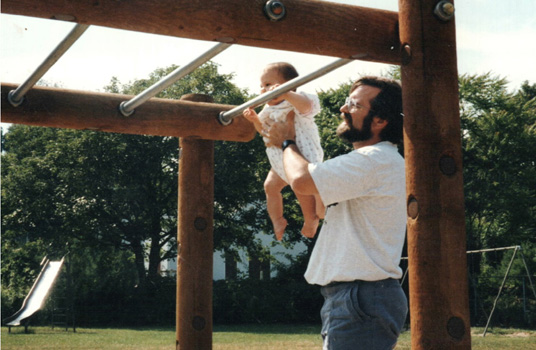Art Kramer wants you to get off the couch and start moving. But there’s no need to run a race or join a gym—he’d be happy if people just walked more. In Europe, Kramer says, people walk and bike everywhere. In America, we drive. We’re fatter because of it, and we have higher rates of diabetes and heart disease too—but our sedentary lifestyle doesn’t just hurt our bodies. According to Kramer, it also harms our brains.
Kramer, a neuroscientist at the University of Illinois at Urbana-Champaign (UIUC), studies how fitness training can mold the mind and stave off the effects of aging. He’s shown that fit kids are better at multitasking and that aerobic exercise can help keep adult brains from shrinking. Kramer has plunked children on treadmills in virtual reality environments, introduced 70-year-olds to ballroom dancing, and slid his subjects into hollow magnetic tubes—magnetic resonance imaging (MRI) machines—to scan their brains. He makes sure to try most of his experimental tests himself. “I’ve been stuffed in magnets for hours,” he says.
Though a leg injury keeps Kramer from running, he still works out several times a week, plays racquetball, and acts in a community theater when he has time. He’s also a licensed pilot.
Kramer spoke at the February 2012 meeting of the American Association for the Advancement of Science in Vancouver, Canada, as part of a panel of experts in brain research and aging. SciCom’s Meghan Rosen jogged to catch up with him afterward.
You used to be a boxer. How did you move from boxing to science?
There were two things I liked as a young man: sports and science. My dad was a light heavyweight, so he taught me how to box. I boxed for years, but it’s probably not the best thing to do for your brain.
The exercise may have been good for it.
I was in the best shape of my life. I also used to do triathlons and marathons, but you have more motivation to move as a boxer because people are hitting you.
"[Europeans] ride their bikes. We don’t. We drive everywhere. Public transportation is great, but a little more walking would be good."
How did you switch to research?
I was fortunate to go to a high school that offered a lot of science. I got to take anatomy and oceanography—that’s pretty rare. Then I got a New York State Regents scholarship and studied biology and psychology at Stony Brook. I decided this psychology stuff—studying the mind and the brain—was something that sounded interesting.
Does everyone ask you what type of exercise is best for the brain?
They do. I suggest anything aerobic: bicycling, walking, running, swimming, skiing. They all work. We’re also learning about non-aerobic types of exercise like strength training. There seem to be some cognitive benefits there too, but there’s much less data right now.
How fit do people have to be? Do they have to be ultra-marathoners?
Absolutely not! The subjects in our studies—the older folks—range from about 60 to 80, and I would call them professional couch potatoes. These are people who never did any exercise for most of their lives. After 6 months or a year of walking, they’re certainly fitter than they used to be, but nobody’s winning races. These are very modest improvements: 10% to 15%, max.
What does aerobic exercise physically do to your brain?
It does many things. It increases the production of neurotransmitters and neurotrophins, which can create more neuronal connections. It increases angiogenesis—more vascular structure. It even can even increase neurogenesis, at least in the hippocampus.
Does it actually make parts of your brain bigger?
Yes. We looked at the hippocampuses of people who exercised 3 days a week, 45 minutes to an hour a day over the course of a year. We compared the aerobic group to the toning group. The aerobic group increased brain volume—the volume of the hippocampus—about 2%.
So, do you think Lance Armstrong has a huge brain?
Well, Lance Armstrong must have been in phenomenal shape. And he seems smart enough—none of the doping charges have stuck.
Does your brain shrink if you stop exercising?
We don’t know that, but your brain shrinks naturally as you age. Gray matter and white matter decrease.
If you held the brains of an old person and a 35-year-old marathoner in your hands, what would they feel like?
The old person’s brain would be lighter and smaller, in terms of the amount of tissue, but I don’t know if it would feel that discernable. It’s not going to be a huge difference. But if you see pictures of older brains, you see a lot more cerebral spinal fluid and a lot less tissue.
How does exercise affect the brains of people with multiple sclerosis or Alzheimer’s?
Alzheimer’s patients can benefit from exercise programs. Of course they’re not functioning as well as non-Alzheimer’s patients, but the effects are about the same. We’ve also done work with MS patients and found that those who exercise tend to have more brain structure, including more gray matter and white matter, than those who aren’t exercising. Pretty much every population that’s been examined has seen benefits from exercise.
You’ve also studied the effects of exercise on children’s brains.
You look around and see all these kids that sit in front of the TV and don’t get out and exercise, and you really worry. Our brains are changing throughout our lifespan, but at a much greater extent with kids. So one question we had was whether high-fit kids would also do better intellectually. And that’s indeed what we’ve found—we’re now running an intervention.
Could you tell me about that?
It’s an after-school program that’s two hours a day, five days a week for a school term. You can’t ask a kid to walk two hours a day, though. They’ll laugh at you. Older people, it’s fine, they’ll do it. But with kids, you have to have games. And we do. We’ll have 65 to 70 kids, half in the control group, and half in the intervention group, and we’ll be able to look at changes in brains and cognition within individual children. We also have them on the treadmill.
What do they think about that?
Oh, they love it! They all ask if they can take the treadmill video game home. Except it would probably cost their parents a few hundred thousand dollars.
What do you think about games like the Nintendo Wii or the Xbox Kinect?
They’re not enough exercise for a child, in my opinion. It might be a great start for an older adult that’s pretty sedentary. In fact, I’ve heard of nursing homes that have Wii bowling tournaments. But kids can do more than that.
Do you know of any other cultures that are more fit than ours?
Yeah, pretty much every culture.
So is everyone else smarter than we are?
Maybe. When I go to Europe, people often say to me, “We don’t exercise.” I ask them questions about riding bikes and walking—that’s what they do! They ride their bikes. We don’t. We drive everywhere. Public transportation is great, but a little more walking would be good.
Does exercise selectively improve memory or attention or does it generally improve everything?
Well, both. The last time I typed "brain training" in Google, I got 14 million hits. So it’s a hot topic, and there are hundreds of products that people will sell you to improve your memory, your decision-making, or your attention. Whether they really accomplish that outside of the games you’re playing is a good question. For the most part they do not. But even if you look at the best of cognitive training, the effects tend to be very narrow. So if you train somebody in memory, they might get better in memory but not in decision-making or attention, and vice versa.
The interesting thing about physical activity is that it has broad effects across many different types of cognition, perception, and attention. And you get bigger effects for some aspects than others.
That’s a good reason to exercise.
Yeah! We also have another intervention that I thought my colleagues at NIH [the National Institutes of Health] would think was a crackpot idea. I got together with [an experimental psychologist and actor/director couple—Helga and Tony Noice] who teach at a small college near Chicago, and we thought it would be interesting to learn about the brain circuits that underlie the cognitive benefits of acting. NIH was kind enough to give us the money to do the experiment.
The experiment is with acting?
Yes, we train older folks in acting techniques.
What kind of exercise does that incorporate?
Oh, everything. Have you ever done any acting?
Nope.
Well, acting is physical. If I’m mad at you I have to shake you, right? I have to threaten you. That’s what you would do if you were on the stage. Everybody thinks the words are the hard part. The script is easy. The hard part is putting together your facial expressions with your gestures. Acting is emotional. Acting is intellectual. Acting is physical. Acting is social. All of these things can contribute to neuroprotection as we age.
Have you thought about acting with kids?
I haven’t. We’re pretty much tapped out now. We have four interventions ongoing. Acting, dance, the afterschool program with kids, and a large [U.S] Navy grant to examine the brain circuits that underlie different aspects of learning. We have a big video game training project with 200 undergraduates where we’re looking at how specific video games relate to different aspects of cognition: from reasoning to attention to processing speed.
What type of video games do the undergraduates play?
We’re using something called casual games—the games you can download, like Angry Birds. My favorite is Sushi Chef. People come into your restaurant, and you have to learn all the ingredients of different kinds of sushi, and serve people depending upon how pressed they are for time. So these are all aspects of executive control, working memory and multitasking.
So playing games on the iPhone is a way to stay sharp?
We’ll see!
Do you think it’s ever too late to start exercising?
We haven’t seen a point of no return yet. Is it better to start earlier? Yeah, I would imagine so. But I don’t think there’s any excuse not to do it. The older people often say to me, “Oh, but I’m too old!” and I say, “That’s nonsense. Total nonsense. Come up with a better excuse. You’re never too old. Do you want to get older?”
_________________________
Meghan Rosen, a graduate student in the Science Communication Program at UC Santa Cruz, earned her bachelor's degree in biology from Northern Arizona University and her Ph.D. in biochemistry and molecular biology from UC Davis. She has worked as an intern at the Santa Cruz Sentinel, KUSP-FM public radio, and the Multiple Sclerosis Discovery Forum. She's moving to Washington D.C. for a summer internship at Science News.
© 2012 Meghan Rosen


